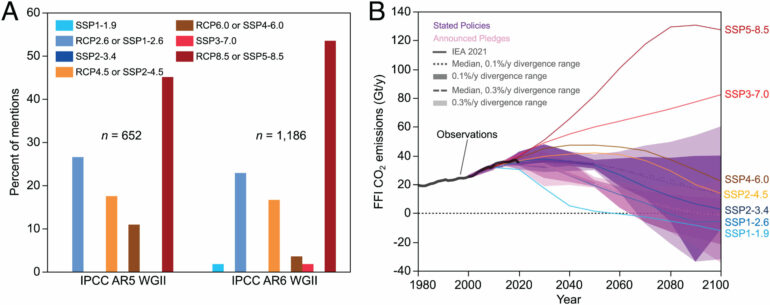We’ve seen it splashed across news headlines: future sea-level rise that could consume the state of Florida, predicted global temperature spikes of 9 degrees Fahrenheit by 2100—threats of catastrophic climate scenarios leading to societal collapse. But now, a University of Colorado Boulder-led team is pushing for climate scientists to put the more likely and plausible middle-range scenarios to the research forefront, instead of solely the worst-case futures.
“We shouldn’t overstate or understate our climate future,” said Matt Burgess, Cooperative Institute for Research in Environmental Sciences (CIRES) fellow, assistant professor at CU Boulder and lead on a letter published this week in Proceedings of the National Academy of Sciences (PNAS). “People need to think in terms of gradations, not absolutes. Yes, we need to be aware of the extremes, like climate solutions that get us to net zero before mid century, or on the flipside, global catastrophes. But it’s what’s in the middle that is more likely. And that deserves more research.”
The letter, coauthored by CU Boulder’s Roger Pielke Jr. and University of British Columbia’s Justin Ritchie, is a reply to a PNAS perspectives paper entitled, “Climate Endgame,” led by University of Cambridge’s Luke Kemp, that argues catastrophic climate futures, including human extinction, should be a main emphasis in climate research.
The CU Boulder team argues overemphasizing worst-case climate scenarios, like RCP 8.5, turns attention away from the most likely future. “Right now, not as many climate models focus enough attention on middle scenarios,” said Burgess. “The SSP2-3.4 scenario, which might be one of most plausible emissions scenarios, wasn’t featured at all in the IPCC’s latest impacts and physical science reports. That should probably change.”
According to Burgess, we shouldn’t ignore the RCP 8.5 and SSP5-8.5 climate scenarios completely. “We want to know what might happen in extreme scenarios, and physical climate cycle feedbacks might make warming worse than emissions would suggest. But for the emissions in that scenario to happen, all the regions in the world in 2100 would need to have over $100k GDP per capita, with no climate policy the whole century, all-in on coal, despite facing unlivable heat in tropical regions with the warming that scenario produces. That’s just not realistic,” Burgess added.
And on the other side of the spectrum, we also are unlikely to hit the low-end climate warming scenarios that limit warming to 1.5 degree C by 2100. “That would be a daunting task to keep us that low—we are almost there now,” said Burgess.
Many experts agree that what’s much more likely is something more in the range of 2 to 3 degrees C (3.6 to 5.4 degrees F) of warming by 2100, Burgess said. By studying these middle-ground scenarios, scientists can focus on understanding those climate impacts that may be harmful and locally severe, but probably not catastrophic to humanity as a whole: more severe heat waves, places like California continuing to get drier and less-than-ideal ski seasons here in Colorado.
Climate catastrophism may also be contributing to the youth mental health crisis, the letter states. Over 40 percent of young adults reported thoughts of climate change negatively affecting their daily lives and functioning or making them hesitant to have children.
“We don’t want to ignore the possibility of catastrophic societal collapse or human extinction, but it shouldn’t be our main focus right now,” said Burgess.
More information:
Matthew G. Burgess et al, Catastrophic climate risks should be neither understated nor overstated, Proceedings of the National Academy of Sciences (2022). DOI: 10.1073/pnas.2214347119
Luke Kemp et al, Climate Endgame: Exploring catastrophic climate change scenarios, Proceedings of the National Academy of Sciences (2022). DOI: 10.1073/pnas.2108146119
Provided by
University of Colorado at Boulder
Citation:
Researchers studying climate futures shouldn’t jump to extremes (2022, October 14)



